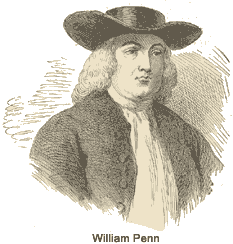Like colonies elsewhere, European tumult shaped the nature and composition of American settlements. The Reformation touched off years of religious controversy and sent thousands in search of havens in which they could practice their beliefs. Pennsylvania received a wide sampling of these refugees, including Quakers, Roman Catholics, Puritans, Calvinists, Huguenots, and Pietists. Those emigrants not motivated by religious reasons were often dislocated by warfare or economic deprivation.
The Dutch claim to the area was established by Henry Hudson, when he sailed into Delaware Bay in 1609. In later years, Cornelius Hendricksen followed up on Hudson's reports, further explored the region and established a settlement near present-day Philadelphia.
 In 1681, Charles II of England granted 40,000 square miles of land controlled by his brother, the Duke of York, to William Penn, son of a famous admiral of the same name. Penn's original name for the colony was to be New Wales, but that suggestion was rejected. Instead, he chose Sylvania (meaning "woods") and it was modified by the King to "Pennsylvania" in honor of Penn's father.
In 1681, Charles II of England granted 40,000 square miles of land controlled by his brother, the Duke of York, to William Penn, son of a famous admiral of the same name. Penn's original name for the colony was to be New Wales, but that suggestion was rejected. Instead, he chose Sylvania (meaning "woods") and it was modified by the King to "Pennsylvania" in honor of Penn's father.